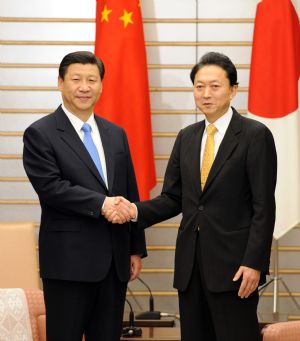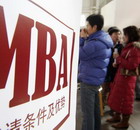Foreign and Military Affairs
China, Japan build ties amid dispute
By Li Xiaokun and Zhang Haizhou (China Daily)
Updated: 2009-12-15 07:06
Japanese Prime Minister Yukio Hatoyama, who shouldered huge domestic pressure for a meeting between visiting Chinese Vice-President Xi Jinping and Japanese Emperor Akihito, said yesterday he "earned the chance" to deepen ties with Beijing.
 Chinese Vice President Xi Jinping (L) shakes hands with Japanese Prime Minister Yukio Hatoyama in Tokyo, Japan, Dec. 14, 2009. [Xinhua] |
"I'm convinced that I got the chance to promote mutually beneficial relations (with China)," Hatoyama said at a dinner in Xi's honor.
| ||||
According to a Foreign Ministry press release, the two leaders touched upon a string of sensitive topics.
Hatoyama told Xi that Japan should have the courage to face history and push for ties with Beijing, said the ministry's release. More details of the talks were not released.
He said that Japan "respects China's stance on the Taiwan issue and regards Tibet-related affairs as China's domestic affairs". The Japanese prime minister also invited China to work with Japan to build an "East Asian Community", the hallmark of his foreign policy.
"I would like to thank Prime Minister Hatoyama and the government for their careful preparations made for my visit," Xi told Hatoyama at the start of the talks.
He noted that the two largest Asian economies should push the green economy as the pillar of "post-crisis" cooperation and said China would like to take a leading role in East Asian integration.
Outside the residence, a controversy over today's scheduled meeting between Xi and Japanese Emperor Akihito escalated into a fierce political row and dominated headlines on the front pages of Japanese newspapers yesterday.
Japan has strictly followed a rule for almost a decade that any meeting with the emperor by a visiting foreign dignitary should be scheduled at least a month in advance.
But the head of the Imperial Household Agency said over the weekend that the meeting request from China arrived on Nov 26. At first, the agency declined the request but later was persuaded by the Japanese government to accept.
A string of leaders and influential figures of the opposition Liberal Democratic Party of Japan (LDP) yesterday attacked the ruling Democratic Party of Japan (DPJ) for "political use of the emperor".
Several politicians also lashed out at what they called special treatment of Xi, including the display of Chinese flags outside public buildings.
DPJ No 2 official Ichiro Ozawa yesterday asked a senior official of the Imperial Household Agency, who harshly criticized the arrangement, to resign, the Kyodo news agency said.
Liu Jiangyong, a senior expert on Japan studies with Tsinghua University, said some Japanese politicians have "made a mountain of molehills" on this topic for their own interests.
"Actually it's natural for the Japanese emperor to meet visiting Chinese leaders. The emperor was delighted to see then vice-president Hu Jintao who visited Japan in 1998 and Premier Wen Jiabao who visited in 2007 to further thaw once frozen relations," Liu said.
"The accusation that the meeting is a political use of the emperor is malicious," Liu said. "Some politicians are using the case to combat the ruling party and warming relations with China."
"Why would anyone be upset about a huge trade delegation?" Phil Deans, professor of international relations at Temple University's Tokyo campus, told Reuters. "Japanese people are very realistic. They know the future is very much intertwined with China."
Xi is on an official visit to Japan, the Republic of Korea, Cambodia and Myanmar beginning yesterday until next Tuesday. He is the first top Chinese leader to visit Japan since the DPJ took power.










